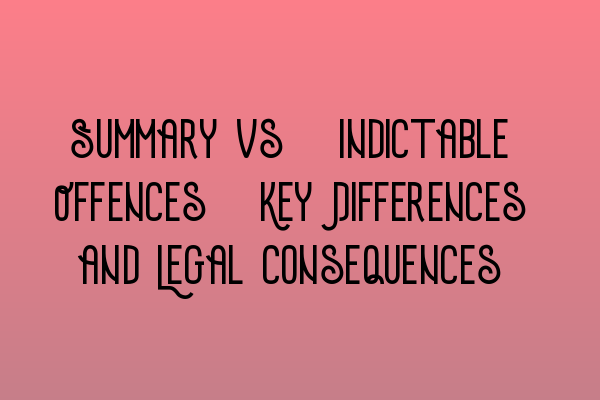Summary vs. Indictable Offences: Key Differences and Legal Consequences
When it comes to criminal offences in the UK, there are two main categories: summary offences and indictable offences. Understanding the differences between these two types of offences and their legal consequences is essential for both legal professionals and the general public.
Summary Offences
In simple terms, summary offences are less serious criminal offences that can be tried by magistrates without a jury. These offences are typically minor in nature and carry relatively lower penalties compared to indictable offences.
Examples of summary offences include common assault, shoplifting, criminal damage, and minor driving offenses such as speeding or driving without insurance. The maximum penalty for most summary offences is usually limited to fines, community service orders, or short-term imprisonment of up to six months.
One key characteristic of summary offences is that they cannot be appealed to the Crown Court after being tried by magistrates. This means that the decision made by the magistrates is final, and there is no opportunity for further legal recourse.
It’s important to note that some offences can be either summary offences or indictable offences, depending on the circumstances. For example, theft is a summary offence if the value of the stolen goods is low, but it becomes an indictable offence if the value exceeds a certain threshold.
Indictable Offences
Indictable offences, on the other hand, are more serious criminal offences that require a trial in the Crown Court, usually with a jury. These offences carry more severe penalties and are reserved for more serious crimes such as murder, robbery, rape, and drug trafficking.
Unlike summary offences, indictable offences have no restrictions on the maximum penalty that can be imposed. For example, murder carries a maximum penalty of life imprisonment, while robbery carries a maximum penalty of imprisonment for up to 14 years.
In addition to the severity of the penalties, another key difference between summary and indictable offences is the right to a jury trial. Defendants facing indictable offences have the right to be tried by a jury of their peers, which is seen as a fundamental aspect of the criminal justice system in the UK.
It’s worth mentioning that some indictable offences can be “triable either way.” This means that they can be tried either in the magistrates’ court or the Crown Court, depending on the seriousness of the case and the defendant’s preference.
Legal Consequences
The legal consequences of being charged with a summary offence versus an indictable offence can vary significantly. In general, summary offences tend to result in lower penalties, while indictable offences can lead to more severe punishments.
Being charged with a summary offence may involve fines, community service, a criminal record, or short-term imprisonment. These penalties can have an impact on employment prospects, travel opportunities, and personal reputation.
Indictable offences, on the other hand, carry the risk of long-term imprisonment, substantial fines, and the potential for significant damage to one’s personal and professional life. Convictions for indictable offences often result in being labelled as a serious criminal, which can have long-lasting consequences even after serving the sentence.
To fully understand the legal consequences and potential defenses for both summary and indictable offences, it is crucial to consult with a qualified criminal law solicitor. They can provide expert advice tailored to the specific circumstances of each case and guide individuals through the complexities of the criminal justice system.
Conclusion
In summary (no pun intended), summary offences are lesser criminal offences that can be tried by magistrates without a jury, while indictable offences are more serious crimes that require a trial in the Crown Court with a jury. The legal consequences and potential penalties for these two types of offences differ significantly, with indictable offences carrying higher risks and more severe punishments.
If you’re interested in learning more about criminal law and practice in the UK, we encourage you to explore our related articles:
